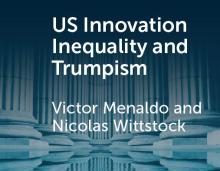UW Political Science Professor Victor Menaldo and Graduate Nicolas Wittstock write about the divisions not just politically but in economic terms of innovation inequality.
While high-profile tech figures like Elon Musk and venture capitalist Marc Andreessen have endorsed former President Donald Trump, these endorsements are outliers in a broader pattern where highly innovative regions largely support the Democratic Party and its presumptive nominee, Vice President Kamala Harris. In a recent development, hundreds of venture capitalists publicly endorsed Harris, mirroring a pattern we saw in previous presidential elections going back decades: Tech loves Democrats...
...innovation inequality has become a more politically salient issue in recent years, driving a wedge between regions at the forefront of technological progress and those left behind. This division helped put Trump in office in 2016 and it may do so again in 2024...
...In our own backyard, the federal government helped transform Richland into a thriving community: The Hanford site was instrumental in the Manhattan Project, serving as the location for plutonium production used in the atomic bomb dropped on Nagasaki. During the Cold War, Richland continued to serve as a hub for nuclear research and development, attracting scientists, engineers and skilled workers. This influx of talent and resources contributed to a vibrant local economy and fostered a culture of innovation, with the city becoming a center for nuclear technology and scientific advancement.
Today, Richland and the rest of the Tri-Cities area have an economy centered on agriculture, manufacturing and health care. The presence of the Pacific Northwest National Laboratory offers Richland a unique advantage as it continues to contribute cutting-edge research around renewable energy and environmental science. The PNNL is a major employer in the Tri-Cities area, partnering with local schools, universities and regional businesses to engage in STEM education initiatives and foster innovation.
Yet this is a luxury that most smaller communities in Washington state and elsewhere lack, highlighting the need for strategic investments and policies that enable smaller communities to thrive in a rapidly changing economic landscape during the age of digital platforms and AI.
Please link here for the full article.
